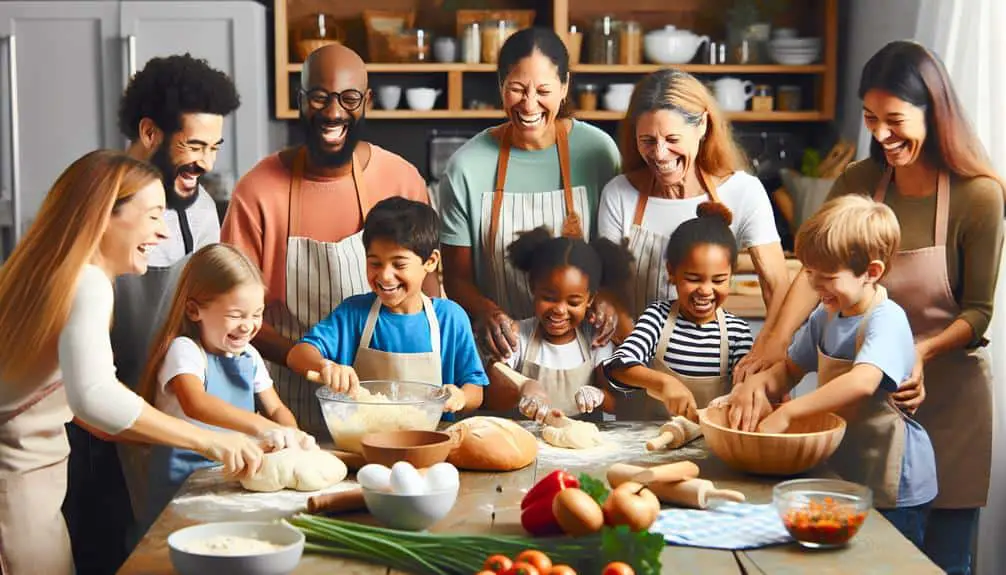Enhance your homeschooling with co-op cooking classes that promote collaboration and hands-on learning. Choose a co-op that aligns with your culinary focus and interests. Structure sessions with clear objectives and consider group dynamics. Involve parents to lead demos and provide guidance. These classes deepen practical skills in a social setting, exploring ingredients and enhancing real-life application of theory. The full research outlines benefits, co-op selection criteria, session structuring tips, involving parents, and more strategies to maximize the learning experience.
Key Points
- Choose a co-op aligned with culinary interests and schedules.
- Structure sessions with clear objectives and varied responsibilities.
- Involve parents in planning, demonstrations, and feedback.
- Enhance learning through hands-on experiences and teamwork.
- Create a sensory-rich environment to explore diverse cuisines.
Benefits of Co-op Cooking Classes
Participating in co-op cooking classes can enhance your homeschooling experience by fostering collaboration and hands-on learning opportunities. These classes provide a unique setting for honing culinary skills through practical application. By working alongside peers, you can learn different techniques, share tips, and explore diverse recipes, thereby expanding your culinary repertoire.
Moreover, co-op cooking classes offer valuable social interaction. Engaging with other homeschooling families creates a supportive environment where you can exchange ideas, build friendships, and develop teamwork skills. Sharing the joy of cooking with others not only enhances your learning experience but also cultivates a sense of community within the group.
Through these classes, you not only improve your culinary abilities but also benefit from the collective knowledge and experience of your peers. Embrace the opportunity to enhance your cooking skills while fostering meaningful social connections in a collaborative learning environment.
Choosing the Right Co-op
When selecting the right co-op for your homeschooling family's cooking classes, consider the specific culinary focus and scheduling options available to guarantee alignment with your learning goals and lifestyle. Co-op selection is pivotal for a successful homeschooling experience, so finding a suitable group is essential. Look for a co-op that offers a culinary focus that matches your interests and educational objectives. Some co-ops may emphasize baking, while others focus on international cuisines or healthy cooking. Consider your family's dietary preferences and cooking skill levels when choosing a co-op to make certain that it aligns with your needs.
Additionally, examine the scheduling options provided by different co-ops. Some groups may meet weekly, while others gather bi-weekly or monthly. Determine the frequency of classes that works best for your family's routine and commitments. Evaluate the location of the co-op as well, ensuring it's convenient for you to attend regularly. By carefully considering these factors, you can select a co-op that enhances your homeschooling journey and provides valuable culinary learning experiences for your family.
Structuring Co-op Cooking Sessions
To enhance the effectiveness of your co-op cooking sessions, consider establishing a clear structure that outlines the objectives, responsibilities, and timeline for each class. Lesson planning is important to make sure that each session aligns with the learning goals of the group. Start by defining the specific skills or recipes to be covered and create a schedule that allows enough time for hands-on cooking and group discussions.
When structuring your co-op cooking sessions, it's important to take into account group dynamics. Assigning roles within the group can help distribute responsibilities and foster teamwork. For example, you could have one student in charge of gathering ingredients, another responsible for reading the recipe instructions, and a third leading the cooking process. Rotating these roles can also help keep everyone engaged and provide opportunities for different members to take on leadership positions.
Involving Parents in Co-op Activities
Parents play an essential role in enhancing the co-op activities by providing support, guidance, and valuable contributions to the learning experience. Here are four ways parents can get involved in co-op activities to enrich the hands-on learning experience:
- Assist in Planning: Parents can help organize the cooking sessions, plan the recipes, and make sure all necessary ingredients and equipment are available. This involvement fosters a sense of responsibility and organization skills in children.
- Lead Demonstrations: Parents can take turns leading cooking demonstrations, showing various techniques and explaining the science behind different cooking processes. This hands-on approach helps children understand the practical application of concepts learned in theory.
- Encourage Participation: Parents can motivate active participation from all children, ensuring everyone gets involved in the cooking process. This fosters teamwork, communication, and collaboration skills among the children.
- Provide Feedback and Support: Parents can offer feedback on the dishes prepared, highlighting the strengths and areas for improvement. This constructive feedback helps children learn from their experiences and aim for continuous improvement in their culinary skills.
Enhancing Learning Through Co-op Cooking
Enhancing learning through co-op cooking involves integrating hands-on experiences and culinary knowledge to deepen understanding and practical skills in a collaborative setting. Collaborative learning allows homeschooling families to work together in the kitchen, sharing ideas, techniques, and responsibilities. This approach not only enhances social skills but also fosters a sense of teamwork and unity among participants.
Crucial experience is a critical aspect of co-op cooking classes as it provides a sensory-rich environment for learners to explore ingredients, cooking methods, and cultural aspects of food preparation. By actively engaging in the cooking process, students can apply theoretical knowledge to real-life situations, reinforcing their understanding of various concepts such as measurements, food safety, and nutrition.




